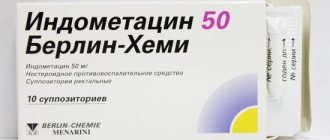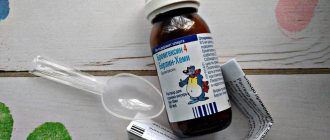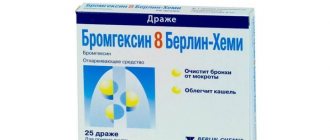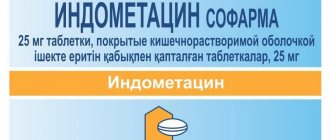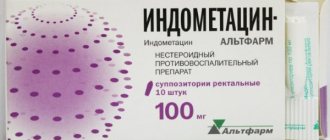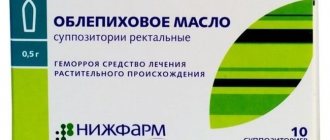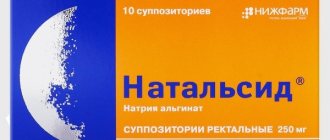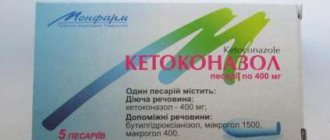Nosological classification (ICD-10)
- H60 Otitis externa
- H66 Suppurative and unspecified otitis media
- H70 Mastoiditis and related conditions
- J01 Acute sinusitis
- J02.9 Acute pharyngitis, unspecified
- J03.9 Acute tonsillitis, unspecified (angina agranulocytic)
- J04 Acute laryngitis and tracheitis
- K08.8.0* Toothache
- M06.9 Rheumatoid arthritis, unspecified
- M08 Juvenile arthritis
- M10 Gout
- M13.8 Other specified arthritis
- M45 Ankylosing spondylitis
- M77.9 Enthesopathy, unspecified
- M79.0 Rheumatism, unspecified
- M79.2 Neuralgia and neuritis, unspecified
- N30 Cystitis
- N41 Inflammatory diseases of the prostate gland
- N70 Salpingitis and oophoritis
- N94.6 Dysmenorrhea, unspecified
- R51 Headache
Indications
Due to its complex action, indomethacin is indicated for use in a number of cases:
- neurological disorders (sciatica, lumbago, radiculitis, neuralgia, osteochondrosis);
- diseases of the musculoskeletal system (rheumatism, gout, myositis, ankylosing spondylitis, various types of arthritis, connective tissue damage);
- getting injured (dislocations, fractures, bruises, sprains);
- pain of various etiologies (postoperative, dental, muscle and headaches, pain of the spine and kidneys);
- high temperature (above 38.5 0C), which is not reduced by other antipyretic drugs (paracetamol, ibuprofen).
Indomethacin is used as part of complex treatment (in the presence of severe pain) for diseases of the ENT organs (otitis, pharyngitis, tonsillitis), dentistry (myalgia, inflammation of oral tissues, arthritis of the jaw joints).
Indomethacin suppositories instructions for use in gynecology are characterized as a complex remedy that is used for:
- presence of bleeding;
- inflammatory processes of the pelvic organs (appendages, ovaries, uterine tissues);
- cystitis;
- formation of cysts and fibroadenomas (benign formations in the uterus);
- endometriosis and adhesions;
- obstruction of the fallopian tubes;
- with painful menstruation;
- premature birth - relieves pain, has a tocolytic effect (relaxation of the muscles of the uterus).
Composition and release form
Indomethacin 50 Berlin-Chemie
| Suppositories for rectal use | 1 sup. |
| indomethacin | 50 mg |
| excipients: solid fat, corn starch |
in a blister pack 5 pcs.; in a cardboard pack there are 2, 6 or 10 packs.
Indomethacin 100 Berlin-Chemie
| Suppositories for rectal use | 1 sup. |
| indomethacin | 100 mg |
| excipients: solid fat, corn starch |
in a blister pack 5 pcs.; in a cardboard pack there are 2, 6 or 10 packs.
Mode of application
Indomethacin suppositories, produced by Berlin-Chemie, are a powerful anti-inflammatory drug intended for rectal or vaginal use. The dose is selected by the doctor based on clinical indications and depends on the diagnosis, age, and gender of the patient. The choice of dose is also influenced by the severity of the disease and the presence of concomitant diseases.
Suppositories are inserted into the rectum or vagina, to the greatest possible depth. This allows the components of the drug to reach the blood faster and have a therapeutic effect on the body. Before using suppositories, the intestines must be emptied of contents!
The recommended daily dose of indomethacin for an adult is 1 100 mg suppository per day or 50 mg 1-3 times daily before bedtime. For children over 14 years old - one 50 mg suppository per day. Exception: the period of a gout attack, when it is allowed to increase the daily dose to 200 mg.
The maximum possible dose of indomethacin per day is 200 mg.
For some diseases, doctors prescribe combination treatment with indomethacin, when it is used simultaneously as suppositories (100 mg at night) and tablets (2 pieces during the day). The recommended dose should not be increased to avoid complications!
Pregnancy and breastfeeding
During this period, the use of the drug is contraindicated. But, as an exception, it is prescribed to a woman when the attending physician is confident that the benefits of indomethacin for the expectant mother significantly outweigh the possible harm to the fetus. Cautious use during pregnancy is allowed only in the first and second trimesters, in the third there is an unequivocal prohibition.
Taking medications during pregnancy is a dangerous and not always necessary activity. Perhaps the general unimportant state of the body is a reaction to the future role of the mother. In order not to make a mistake and not to let down either yourself or your unborn child, read the article: Weakness during pregnancy - normal and abnormal?
Contraindications
Hypersensitivity, “aspirin asthma”, gastric and duodenal ulcers, ulcerative colitis, bleeding (intracranial, gastrointestinal), congenital heart defects (coarctation of the aorta, pulmonary atresia, tetralogy of Fallot), impaired color vision, cirrhosis of the liver with portal hypertension , diseases of the optic nerve, bronchial asthma, heart failure, edema, arterial hypertension, hemophilia, hypocoagulation, liver failure, chronic renal failure, hearing loss, vestibular apparatus pathology, glucose-6-phosphate dehydrogenase deficiency; blood diseases; proctitis, hemorrhoids; pregnancy, breastfeeding period, childhood and adolescence up to 18 years.
With caution - hyperbilirubinemia, thrombocytopenia, epilepsy, parkinsonism, depression, children and old age.
What are indomethacin berlin chemo suppositories for?
Attention!
This drug may interact particularly unfavorably with alcohol! Read more.
Dosage form
dragees, capsules, extended-release capsules, injection solution, rectal suppositories, enteric-coated tablets, film-coated tablets, extended-release tablets
How to use: dosage and course of treatment
Orally, during or after meals, washed down with milk, for adults - at an initial dose of 25 mg 2-3 times a day. If the effect is insufficient, the dose is increased to 50 mg 3 times a day.
Retard tablets (75 mg) - 1-2 times a day. The maximum daily dose is 200 mg. When the effect is achieved, treatment is continued for 4 weeks at the same or reduced dose.
For long-term use, the maximum daily dose is 75 mg.
For the treatment of acute conditions or relief of exacerbation of a chronic process - intramuscularly, 60 mg 1-2 times a day.
The duration of the course of intramuscular injections is 7-14 days, subsequently they switch to oral or rectal administration of suppositories (for the treatment of acute conditions or relief of exacerbation of a chronic process - 1 suppository (0.05-0.
1 g) 2 times a day (in some cases as an addition to oral administration of the drug), while the maximum daily dose should not exceed 0.2 g; for maintenance treatment - 0.05-0.1 g once at night.
Rectally: after emptying the intestines, as deep as possible into the rectum, 50 mg 1-3 times a day or 100 mg before bedtime, during an attack of gout 200 mg per day (as an addition to oral administration). The maximum daily dose is 200 mg.
Children over 14 years old: 1.5-2.5 mg/kg/day.
Interaction
Increases plasma concentrations of digoxin, methotrexate and Li+ drugs, which can lead to increased toxicity.
Source: https://BoliGolovnie.ru/varikoz/indometacin-berlin-hemi-svechi-dlja-chego.html
Side effects
From the digestive system: NSAID gastropathy, abdominal pain, nausea, vomiting, heartburn, anorexia, diarrhea, liver dysfunction (increased blood bilirubin, liver transaminases). With long-term use in large doses, ulceration of the gastrointestinal mucosa occurs.
From the nervous system: headache, dizziness, insomnia, agitation, irritability, fatigue, drowsiness, depression, peripheral neuropathy.
From the senses: hearing loss, tinnitus, taste disturbance, diplopia, blurred vision, corneal clouding, conjunctivitis.
From the cardiovascular system: heart failure, tachyarrhythmia, increased blood pressure.
From the urinary system: impaired renal function, proteinuria, hematuria, interstitial nephritis, nephrotic syndrome, papillary necrosis.
From the hemostatic system: bleeding (gastrointestinal, gingival, uterine, hemorrhoidal), thrombocytopenia.
Allergic reactions: skin rash, itching, urticaria, Quincke's edema, bronchospasm; rarely - Lyell's syndrome, erythema nodosum, anaphylactic shock.
Laboratory indicators: agranulocytosis, leukopenia, hyperglycemia, glucosuria, hyperkalemia, aplastic anemia, autoimmune hemolytic anemia.
Other: aseptic meningitis (more often in patients with autoimmune diseases), increased sweating, edema syndrome.
Local reactions: burning, itching, heaviness in the anorectal area, exacerbation of hemorrhoids.
Reviews
Evgeniya, 44 years old, St. Petersburg
I have had rheumatoid arthritis since I was 32 years old. I have been using many anti-inflammatory drugs, including hormones, for a long time. I used Indomethacin for some time - I felt a little nauseous, but the pain went away so well that I felt healthy.
Yaroslav, 29 years old, Vladivostok
I have been practicing karate since childhood and often get injured. There are ligament ruptures and joint dislocations. To relieve pain I use Indomethacin. An effective drug that relieves pain instantly. I did not notice any side effects for myself, perhaps due to short-term use.
Dmitry, 45 years old, Ekaterinburg
I have been suffering from gout for 4 years now. The bone at the base of the big toe on the left foot often hurts. The pain is sometimes unbearable, and I cannot walk or even step on my leg. Along with drugs for the treatment of an acute attack of gout, I used Indomethacin several times.
Grigory, 38 years old, Nizhny Novgorod
Find out your potency level
Take a free online test, which is used in international practice to determine the level of potency
Choose only one answer for each question. At the end of the test you will receive a conclusion.
5 simple questions
93% test accuracy
10 thousand tests
Repeatedly used Indomethacin to treat radiculitis. Several times it hurt so much that I could not straighten my back. At such moments, only this drug helped me out. I felt sick several times, but this feeling quickly passed after the end of treatment.
Olga, 28 years old, Tula: “Suppositories are suitable for those who do not like to take pills or have gastrointestinal diseases. They have a less pronounced irritant effect on the gastric mucosa and rarely cause nausea. I used them for migraines, acute tonsillitis and inflammation of the appendages.
Lyubov, 60 years old, Moscow: “My husband has been suffering from gouty arthritis for a long time. During an exacerbation, the bones in the legs swell and begin to hurt, which prevents normal movement. The doctor advised to administer Indomethacin suppositories.
Interaction
Reduces the effectiveness of uricosuric drugs, antihypertensive and diuretics (saluretics); enhances the effect of indirect anticoagulants, antiplatelet agents, fibrinolytics, side effects of mineralocorticosteroids, estrogens, and other NSAIDs; enhances the hypoglycemic effect of sulfonylurea derivatives.
Combined use with paracetamol increases the risk of nephrotoxic effects. Ethanol, colchicine, glucocorticosteroids - increase the risk of developing gastrointestinal complications accompanied by bleeding.
Increases the concentration of lithium, methotrexate and digoxin in the blood. Cyclosporine and gold preparations increase the nephrotoxicity of indomethacin. Cefamandole, cefoperazone, valproic acid - increase the risk of developing hypoprothrombinemia and the risk of bleeding. Reduces the elimination of penicillins. Potentiates the toxic effect of zidovudine.
Analogs
Some medications in the form of suppositories have a similar anti-inflammatory and antipyretic effect on the body.
Indomethacin suppositories can be replaced with the following analogues:
"Diclofenac"
Biochemist, Russia / Ratiopharm, Germany Price from 58 to 70 rubles.
The active ingredient is diclofenac sodium. Refers to non-steroidal anti-inflammatory, antirheumatic drugs.
pros
- Effectively and quickly relieves pain and inflammation
- Different forms (ointment, injections, tablets)
Minuses
- Negatively affects the kidneys and liver
- It cannot be used during pregnancy, as it has the ability to penetrate deeply, which can harm the fetus.
"Naproxen"
EMO-PHARM, Bulgaria / Akrihim, Russia Price from 124 to 165 rubles.
Non-steroidal anti-inflammatory drug. The active ingredient is naproxen. It is one of the anti-inflammatory, antipyretic, analgesic drugs.
pros
- Efficiency in the treatment of pain in joints, muscles, spine, accompanied by inflammation
- There are various forms of release - you can choose the most convenient one
Minuses
- Use with caution for gastrointestinal problems
- May weaken the positive effects of some drugs, as well as increase the toxicity of others.
Instructions for the use of Indomethacin suppositories in gynecology: reviews and how much do they cost?
07/13/2018 Olga Migunova 0 comments
Indomethacin suppositories are non-steroidal drugs that have the ability to stop the inflammatory process. The product also has other properties characteristic of similar drugs. Typically, suppositories are included in the complex therapy of pathologies. The drug is prescribed by a doctor after diagnosing the disease.
Properties
Suppositories can be used both rectally and vaginally (in women). This drug, penetrating into the bloodstream, inhibits the production of prostaglandin hormones.
Their production contributes to the development of inflammation and pain. Due to the good absorption of this drug, the therapeutic effect occurs quite quickly, within the first week from the start of use.
Unlike tablets, suppositories have a great advantage when using them. They are not exposed to acids and enzymes in the gastrointestinal tract, but enter directly into the bloodstream.
Composition and properties of Indomethacin suppositories
Indomethacin is a non-steroidal drug with complex effects:
- The analgesic effect is achieved by reducing pain of various etiologies or completely relieving it.
- Reduces high temperature without affecting its normal levels.
- Relieves inflammatory processes and swelling by blocking the synthesis of prostaglandins.
- Anti-inflammatory and antipyretic effects.
Additionally, the drug helps thin the blood, which reduces the likelihood of developing thrombosis.
The active component is a derivative of indolylacetic acid - indomethacin. Additional components of suppositories are hard fat (softens the tissue surface making it susceptible to rapid absorption of indomethacin) and corn starch (provides protection for the mucous membrane and nerve endings from irritation by the drug, neutralizes acids).
Use in women
In gynecological practice, indomethacin suppositories are used vaginally.
They give a positive effect during therapy:
- Hemorrhoids, which very often develops in the postpartum period.
- With a painful menstrual cycle (algomenorrhea).
- For the treatment of endometriosis and cystitis.
- Often this medication is prescribed along with antibacterial therapy. For the treatment of ovarian cysts, in case of threat of miscarriage, adnexitis.
Treatment methods for female diseases
Use of Indomethacin suppositories in gynecology:
- For the treatment of cystitis in women , which is often associated with hypothermia or infection from other lesions, unpleasant painful symptoms occur when urinating. In order to prevent the acute process from developing into a chronic form of the disease, it is very good to use suppositories with Indomethacin. They are prescribed 50 or 100 mg (depending on the severity of the process) before bedtime.
- Ovarian cysts also respond well to treatment with this medication, which is used as for cystitis.
- Algodysmenorrhea is a severe pain syndrome that occurs during the menstrual cycle and is associated with an increase in the level of prostaglandins in the blood. To prevent it, it is necessary to use this medicine two to three days before the onset of menstruation.
- Sometimes this remedy is prescribed during pregnancy to relieve uterine hypertonicity. In this case, suppositories can be used both rectally and vaginally at 50 mg per day.
Use in men
Indications for the use of Indomethacin in men are the treatment of chronic prostatitis, or when its seasonal exacerbation occurs.
Rectal suppositories help to positively influence the size of the prostate (reduce in size), and have a lasting, anti-inflammatory effect.
As a rule, they are prescribed to insert one suppository into the anus in the morning and evening.
After the first day of taking this medication, take a short break, during which the body’s reaction to the tolerance of this drug is determined.
If side effects or allergic reactions occur, the administration of suppositories is stopped.
Indomethacin suppositories, compared with other pharmacological forms, have the following advantages:
- In terms of action, the rate of development of the therapeutic effect is equal to parenteral administration.
- There is a prolonged effect on the source of the disease.
- The biological activity of the drug reaches 90%.
- Bypassing the gastrointestinal tract, it does not have a direct effect on it.
When prescribing them, you must strictly follow all the instructions prescribed by the doctor.
Use during pregnancy and breastfeeding
- In the first trimester of pregnancy, the use of this dosage form is undesirable, because it is at this stage that the internal organs of the future newborn develop. And the use of this medicine can cause developmental pathologies in the baby.
- The second trimester of pregnancy is an exception, and in case of a threat to the health of the mother, short-term use of this drug is allowed.
- In the third trimester , the fetal circulatory system is formed; therefore, suppositories with Indomethacin are not prescribed.
- In the postpartum period and lactation, indomethacin suppositories are allowed to be taken if breastfeeding is interrupted during their use.
Release forms: vaginal and rectal suppositories
Indomethacin suppositories have a white (with a yellowish tint) color and an oblong (torpedo-shaped) shape. Each suppository contains 50 mg or 100 mg of the active ingredient.
The advantages of using the drug in the form of suppositories are:
- local effect directly on the cause of pain/inflammation;
- direct entry of the drug into the blood without negative effects on the digestive tract;
- begin to act 15 minutes after application;
- relatively low cost.
Maximum effectiveness after taking the medicine is achieved after 1.5-2 hours. The therapeutic effect lasts for 4-8 hours. Removal of drug residues is carried out by the kidneys after 4.5-9 hours.
The drug is taken rectally to relieve pain/fever or inflammation of various etiologies. It is possible to use indomethacin vaginally for gynecological diseases. The appropriate treatment method is chosen by the gynecologist after diagnosing the disease.
Elderly age
People try not to prescribe this dosage form in old age. Since it can provoke an exacerbation of old chronic processes and cause unpredictable side effects.
Most often, when this drug is prescribed, it is used in tablet form. This is due to the fact that when they are taken, the effect occurs smoothly.
Suppositories, bypassing the stomach, immediately enter the bloodstream and have an almost instant effect. But for older people this is unacceptable.
